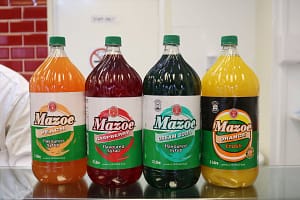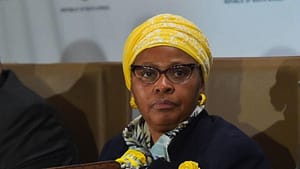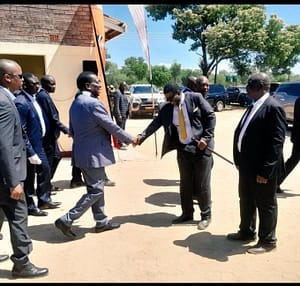Inside a murky Zimbabwean mining hive

Kudakwashe Tagwirei Zimbabwe business tycoon with close connections with President Emmerson Mnangagwa is still on the list of UK sanctions
The ‘Queen Bee’, the State, and questions about a commodity trader turned miner
By Joseph Cotterill
In Zimbabwe’s Shona language, ‘kuvimba’ can mean trust or having faith. It is a great name for a state-owned custodian charged with protecting the impoverished southern African nation’s mineral wealth, riches that have otherwise so often been abused, corrupted and looted over the decades.
Or it would be a great name, if it wasn’t for the fact that ever since Kuvimba Mining House was unveiled last year, President Emmerson Mnangagwa’s government has faced difficult questions about how far the company, in which it holds a 65 percent stake, is linked to a United States-sanctioned businessman: Kudakwashe Tagwirei.
Both the government and Kuvimba have denied that Tagwirei — a former local business partner of Trafigura who has been dubbed ‘Queen Bee’ by Zimbabweans because of his perceived grip on the dispensing of state resources under Mnangagwa — has any involvement at the company. Tagwirei has been publicly silent on these allegations and did not respond to a request for comment on this story.
Queen Bee actually is a great name — in another sense. As Alphaville reported recently, Tagwirei controlled a veritable hive of offshore companies that moved millions of dollars through a central Mauritian commodity trader, Sotic International.
And what has made the questions about Kuvimba particularly difficult is that its assets — which include stakes in nickel, chrome, and gold producers, as well as a platinum deposit — come from Sotic, which embarked on a mine-buying spree in recent years.
For instance, Bindura Nickel, a Sotic-acquired miner that is now in Kuvimba’s portfolio, announced in a stock-exchange filing last year that Sotic had “nominated Kuvimba . . . as the entity receiving the shares” following Sotic’s own takeover in 2019. Kuvimba has said that it acquired Sotic assets in a “restructuring exercise”, without giving details.
One big question, then, is how Kuvimba came to own Sotic’s assets. And, while Zimbabwe’s government denies allying with Tagwirei in Kuvimba, its ties to Sotic have also been less clear. Or until now, that is.
Zimbabwe’s most valuable company?
Christopher Fourie, a former Tagwirei aide and Sotic’s founder, who still holds a stake in the company, has told Alphaville that he did not consent to Sotic’s mine assets being moved to Kuvimba. Meanwhile, according to message records reviewed by Alphaville, Zimbabwe’s government has been intimately involved in Sotic’s affairs all along.
In these messages Tagwirei described the government as a majority owner of the company, despite official shareholder records pointing to the contrary, and ordered Fourie to deal with senior state officials when he voiced concerns about the alleged siphoning of Sotic’s resources to other offshore companies.
Zimbabwe’s finance ministry has been instrumental in promoting Kuvimba, where the state’s overall two-thirds stake is held by public bodies such as a nascent sovereign wealth fund and the country’s insurance and pensions commission, which has said that it will use its five percent shareholding to compensate pensioners who lost out in a currency collapse.
Mthuli Ncube, the finance minister, has even said that Kuvimba will help fund a compensation deal for farmers who were dispossessed by seizures of land under Robert Mugabe, the late dictator deposed in a 2017 coup.
Kuvimba paid a US$1 million dividend for this purpose in July, though that month the government also said that this farmer compensation fund had received a donation of a 12,5 percent stake in the company itself, which it said was worth US$250 million. Even in paper terms, that is a lot of money in the context of Zimbabwe, an economy that had a GDP of about US$16 billion last year.
The valuation would imply that Kuvimba overall is worth US$2 billion, making it Zimbabwe’s most valuable company, beyond the country’s biggest stock-market listings such as Econet, the largest telecom. It would also rival public market values of even some big South African miners, such as Harmony Gold.
Tagwirei does not own a single share of this bonanza, says David Brown, the former chief executive of Kuvimba, who was also Sotic’s chief executive but has denied taking directions from Tagwirei at that company.
In June, when he still headed Kuvimba, Brown told Alphaville that:
He (Tagwirei) certainly does not own a shareholding in the mining assets as we stand today . . . with regard to the shareholding position we have performed a detailed KYC (‘know your customer’) and I stand by what I have been able to verify with documents.
Brown has since told Alphaville that he left Kuvimba at the end of August.
As previously reported by Alphaville, not owning a single share of Sotic didn’t appear to prevent Tagwirei controlling that company, even when Fourie was its original official sole owner. Fourie has said that Tagwirei was not made a direct shareholder in Sotic because he believed this would have triggered KYC alarms at banks that might have cut the company off over the businessman’s political links.
A subsequent — and elaborate — split in Sotic’s official ownership last year is meanwhile crucial to the Kuvimba mystery today, particularly Fourie’s claim that Sotic’s mines were transferred without proper approval.
A Mauritian connection
As Alphaville reported last time, 65 percent of Sotic was acquired by a Cayman Islands-registered investment vehicle, Almas Global Opportunities Fund, in which Tagwirei acquired shares in 2019. Almas has said that Tagwirei doesn’t own shares in the fund any more, and that it is exiting its investment in Zimbabwe.
The other third of Sotic was acquired by Pfimbi, a Mauritian company in which Fourie took a 22 percent stake, alongside stakes held by other executives who were close to Tagwirei. Pfimbi is yet another great name — it has connotations of ‘secret’ or ‘safekeeping’ in Shona. According to shareholder records, some shares in Pfimbi were also taken up by Simbarashe Chinyemba, who has been linked to Kuvimba. Chinyemba did not respond to a request for comment.
Keeping up? Good. More recently, Pfimbi’s status in Mauritius has been in question after its local company agent, Capital Horizons, told shareholders earlier this year that it would cut ties. But Pfimbi and Sotic being based in Mauritius is important for how their assets were moved to Kuvimba.
Mauritian company law requires pre-emption rights to be given to existing shareholders over changes in ownership of assets — terms reflected in Sotic’s company constitution, which has been reviewed by Alphaville.
Despite this, Fourie has said that he was never asked to approve any transactions relating to Kuvimba, and has not received answers from the company or other shareholders. Fourie told us:
If (there have been) any changes to these shareholdings and/or ownership in assets has changed, it was done without the consent of all shareholders, and mine in particular.
Ronelle Sinclair, Christian Weber, and Jozef Behr, South African executives who were Fourie’s fellow shareholders in Pfimbi and who had close ties to Tagwirei, said in response that they had “resigned from all duties including from the board of Sotic International” in June 2020.
“Since then, (Sinclair, Weber and Behr) have had no insight into the affairs and business of Sotic International, Christopher Fourie, or Kudakwashe Tagwirei,” the trio added. Chinyemba, as another Pfimbi shareholder, did not respond to a request for comment. Almas, Sotic’s other investor, declined to comment.
Brown, the former Kuvimba chief executive, said that Chinyemba was involved in setting up the transactions with a Zimbabwean legal team. “My only comment is that Mr Fourie should decide if he was a beneficial or nominee shareholder,” he added. Fourie said he was a beneficial shareholder. “The shares were held in my personal capacity . . . there never was any nominee shareholder agreement in place,” he said.
The Zimbabwean finance ministry did not respond to a request for comment, including to see copies of relevant shareholder approvals for transfers of ownership or management from Sotic to Kuvimba.
So, even though a US$2 billion valuation is riding on the answer, the mystery remains over whether proper shareholder approvals back Kuvimba as the legitimate successor to Sotic’s mines.
That, of course, is based on the official Sotic shareholdings described so far.
It is about to get weirder.
“I am just a minority shareholder”
According to WhatsApp messages reviewed by Alphaville, in May last year, Tagwirei told Fourie that “Sotic is owned by government 65 percent and myself 35 percent,” despite official records that show Almas and Pfimbi owned the company in these proportions.
“I am just a minority shareholder . . . you will best speak to the (main shareholder) who contracted you,” said Tagwirei in one of the messages. Tagwirei did not respond to a request for comment. Fourie told Alphaville that it was his understanding at the time that the 65 percent stake was a proxy for the Zimbabwean government.
Almas told Alphaville that “it is simply incorrect and not factual” that the Zimbabwean government had a majority stake, or Tagwirei a minority stake, in Sotic. The Zimbabwean finance ministry did not respond to a request for comment on whether the government held an undisclosed proxy stake.
Message records reviewed by Alphaville show that Fourie was indeed speaking to a senior state official about Sotic, as Tagwirei suggested. The top civil servant in the finance ministry met Fourie to discuss Tagwirei’s offshore interests, and warned him not to make threats about exposing those involved, according to these messages.
After a “screaming match” early last year, “Kuda informed me that I needed to go see George Guvamatanga,” the ministry’s permanent secretary, Fourie told Alphaville. Guvamatanga and the finance ministry did not respond to requests for comment.
According to WhatsApp messages, Tagwirei instructed Fourie to meet Guvamatanga and Sibusiso Moyo, Zimbabwe’s foreign minister at the time and a former army general who was instrumental in the 2017 coup against Robert Mugabe. Moyo died from Covid-19 earlier this year.
“If it does not work then we go higher,” Tagwirei said in the messages. He did not respond to a request for comment about the messages, including on who was being referred to as going higher.
Fourie told Alphaville that he met Guvamatanga at his ministry office and “most definitely and in the strongest possible way” pressed his complaints about Sotic and other companies.
The two kept up communications thereafter, after Kuvimba had been established, according to the message records.
“Kuda is currently incapacitated… happy to talk to you though,” Guvamatanga, a former chief executive of the former unit of Barclays in Zimbabwe, told Fourie in messages which date from a period earlier this year when Tagwirei was not seen in public for some time. “I can assist on this matter but not when you are threatening everyone like this,” he said. “You need to focus on what you personally want to get out from all this. Everything else will not help you.”
“In the absence of KT I have been speaking to Obey on your matter,” Guvamatanga said in another message, in an apparent reference to Obey Chimuka, an associate of Tagwirei who owned a group of companies that traded with Sotic. Chimuka did not respond to a request for comment.
“To enable me to push for a solution may you send me a summary of what you would regard as a full and final settlement claim. It is in our interest to have this matter urgently resolved amicably,” Guvamatanga added. Fourie sent Guvamatanga a proposed deal to sell his shares in Pfimbi to Tagwirei, according to records. Tagwirei did not respond to a request for comment.
The deal was never implemented. Many questions — about the Zimbabwean government’s true relationship with Sotic, and the legitimacy of its mining successor, Kuvimba — remain unanswered.
Fourie told Alphaville that Guvamatanga and Tagwirei “appeared to be very close and I would classify them as personal friends.” Guvamatanga did not respond to a request for comment. Meeting the civil servant to discuss Tagwirei’s business affairs was “probably not appropriate,” Fourie said.
But, he added, “it is the only way business is done in Zim.” — The Financial Times.





